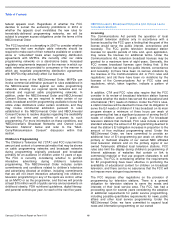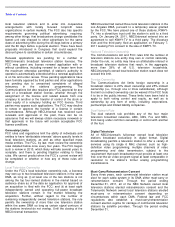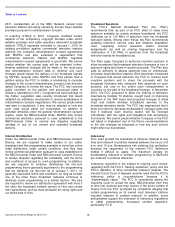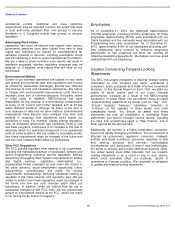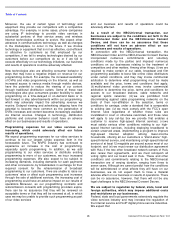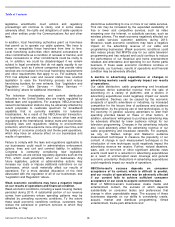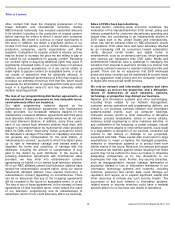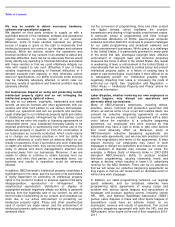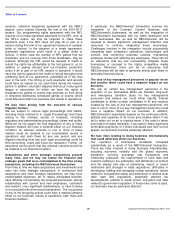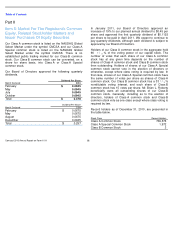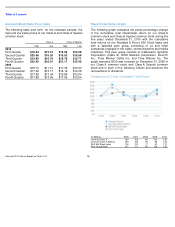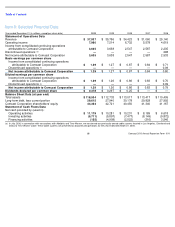Comcast 2010 Annual Report Download - page 32
Download and view the complete annual report
Please find page 32 of the 2010 Comcast annual report below. You can navigate through the pages in the report by either clicking on the pages listed below, or by using the keyword search tool below to find specific information within the annual report.
Table of Contents
27
Comcast 2010 Annual Report on Form 10-
K
other content that meet the changing preferences of the
broad domestic and international consumer market.
NBCUniversal historically has invested substantial amounts
in its content, including in the production of original content,
before learning the extent to which it would earn consumer
acceptance. We intend to continue to invest significantly in
this area. In addition, we obtain a significant portion of our
content from third parties, such as movie studios, television
production companies, sports organizations and other
suppliers. Competition for popular content is intense, and we
may be forced to increase the price we are willing to pay or
be outbid by our competitors for popular content. Renewing
our contract rights or acquiring additional rights may result in
significantly increased costs. If our content does not achieve
sufficient consumer acceptance, or if we cannot obtain or
retain rights to popular content on acceptable terms, or at all,
our results of operations may be adversely affected. In
addition, poor theatrical performance of a film may require us
to reduce our estimate of revenue from that film, which would
accelerate the amortization of capitalized film costs and could
result in a significant write-off, and may adversely affect
multiple reporting periods.
The loss of our programming distribution agreements, or
the renewal of these agreements on less favorable terms,
could adversely affect our business.
Our cable programming networks depend on the
maintenance of distribution agreements with multichannel
video providers. Our broadcast networks depend on the
maintenance of network affiliation agreements with third-party
local television stations in the markets where we do not own
our local television stations. In addition, every three years,
each of our owned local television stations must elect, with
respect to its retransmission by multichannel video providers
within its DMA, either
“must-carry” status, pursuant to which
the distributor’s carriage of the station is mandatory and does
not generate any compensation for the local station, or
“retransmission consent,” pursuant to which the station gives
up its right to mandatory carriage and instead seeks to
negotiate the terms and conditions of carriage with the
distributor, including the amount of compensation (if any)
paid to the station by such distributor. In the course of
renewing distribution agreements with multichannel video
providers, we may enter into retransmission consent
agreements on behalf of our owned local television stations.
All of our NBC affiliated owned local television stations have
elected the retransmission consent option, while our owned
Telemundo affiliated stations have elected must-carry or
retransmission consent depending on circumstances. There
can be no assurance that any of the foregoing agreements
will be renewed in the future on acceptable terms, or at all.
The loss of any of these agreements, or the renewal of these
agreements on less favorable terms, could reduce the reach
of our television programming and its attractiveness to
advertisers, which in turn could adversely affect our business.
Sales of DVDs have been declining.
Several factors, including weak economic conditions, the
maturation of the standard-definition DVD format, piracy and
intense competition for consumer discretionary spending and
leisure time, are contributing to an industry-wide decline in
DVD sales both in the United States and internationally,
which has had an adverse effect on NBCUniversal
’s results
of operations. DVD sales have also been adversely affected
by an increasing shift by consumers toward subscription
rental, discount rental kiosks and digital forms of
entertainment, such as on-demand services, which generate
less revenue per transaction than DVD sales. Media and
entertainment industries face a challenge in managing the
transition from physical to electronic formats in a manner that
generates sufficient revenue to maintain historical profits and
growth. There can be no assurance that DVD wholesale
prices and sales volumes can be maintained at current levels
due to aggressive retail pricing and the consumer transition
to digital and lower-priced rental services.
We rely on network and information systems and other
technology, as well as key properties, and a disruption,
failure or destruction of such networks, systems,
technology or properties may disrupt our business.
Network and information systems and other technologies,
including those related to our network management,
customer service operations and programming delivery, are
critical to our business activities. Network and information
systems-related events, such as computer hackings,
computer viruses, worms or other destructive or disruptive
software, process breakdowns, denial of service attacks,
malicious social engineering or other malicious activities, or
any combination of the foregoing, or power outages, natural
disasters, terrorist attacks or other similar events, could result
in a degradation or disruption of our services, excessive call
volume to call centers or damage to our properties,
equipment and data. These events also could result in large
expenditures to repair or replace the damaged properties,
networks or information systems or to protect them from
similar events in the future. Moreover, the amount and scope
of insurance we maintain against losses resulting from these
events may not be sufficient to cover our losses or otherwise
adequately compensate us for any disruptions to our
businesses that may result. Further, any security breaches,
such as misappropriation, misuse, leakage, falsification or
accidental release or loss of information maintained in our
information technology systems and networks, including
customer, personnel and vendor data, could damage our
reputation and require us to expend significant capital and
other resources to remedy any such security breach. The
occurrence of any such network or information systems-
related events or security breaches could have a material
adverse effect on our business and results of operations.


